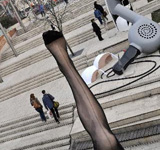| The Preferential Policies to Attract Merchants and Investment of Heilongjiang Province | |
http://english.dbw.cn銆€銆€
2010-03-16 09:39:26
|
|
|
----Tax Preferential Policies---- 1. (1) Any production-oriented FIE scheduled to operate for a period of not less than ten years shall, from the year beginning to make profit, be exempted from income tax in the first and second years and allowed 15 percent reduction of the amount of income tax payable in the third to fifth years. The income tax on FIEs established in Economic and Technological Development Zones or the high and new-tech enterprises in the High and New tech Development Zones defined by the State Council shall be levied at the reduced rate of 15 percent. For production-oriented FIEs in the Boundary Economic and Technological Cooperation Zones, if the enterprise income tax is levied over the rate of 15%, the paid enterprise income tax within 5 years shall be returned. For other enterprises located in the Economic and Technological Development Zones, the High and New Technology Development Zones, and the Boundary Economic and Technological Cooperation Zones, if the enterprise income tax is levied over the rate of 24%, the paid enterprise income tax within 5 years shall be returned. (2) Any FIE producing products for export shall, when the annual export value exceeds 70 percent of its output value, upon approval by the tax authorities, be levied at the reduced rate of 10 percent of income tax for that year after the expiration of the period for tax exemption and reduction. (3) Technology-advanced FIEs may continue to enjoy an extended three-year-period of a 50% reduction in the enterprise income tax when they are still technology-advanced enterprises after the period of exemption from or reduction of enterprise income tax granted according to the stipulations of the tax law. If the tax rate is lower than 10%, and at the same time they can enjoy an exemption from local income tax. (4) Where the income tax of high-tech FIEs and export-oriented FIEs with the annual export value exceeding 70 percent of its output value in eco-tech development zone or boundary eco-tech development zone is levied at rate of 10%, 50% thereof shall be returned; 80% shall be returned if the income tax is levied at rate of 24% in boundary eco-tech development zone. With the approval of the People鈥檚 Government of Heilongjiang Province, other FIEs established in the Economic and Technological Development Zones or the Boundary Economic and Technological Cooperation Zones may enjoy the above preferences as well. (5) For the FIEs with the operation period of more than 10 years, all the paid enterprise income tax within 5 years shall be returned after expiration of 鈥渢wo years tax exemption鈥?policy given they meet one of the two conditions: a. acquire or merger 鈥渃lose-down or deficit enterprise鈥?in Heilongjiang, at least 60% of surplus employees of the enterprise acquired or merged are rearranged, and the amount of foreign investment accounts for more than 50% of total investment; b. foreign investor invests more than USD 5 million, applying new hi-tech to transform Heilongjiang big and medium leading enterprise. (6) Where the preferential policy "tax-free for 2 years and half tax for 3 years" on the enterprises with foreign investment engaging in agriculture, forestry , animal husbandry, and fishery by imported advanced technology is expired, 30% of the income tax that is already paid in fact shall be returned by government financial authority at the same level. (7) In For the export-oriented FIEs of which the annual export value accounts for more than 50% of the total output value, the production-oriented FIEs with advanced technologies, and the FIEs engaging in resource exploitation, traffic, energy, communication, energy saving, agriculture, forestry, animal husbandry, and fishery, within certain period of time after the expiration of 鈥渓ocal income tax exemption period鈥? the local income tax can be continually exempted with the approval of tax authority, given that there is hardship in production and operation. (8) Any FIE enjoying the enterprise income tax preferences by the State or the province are free charge of local income tax. (9) For Sino-foreign joint venture enterprises involving in the building of port and wharf, the enterprise income tax will be reduced and collected at the rate of 15%. For the enterprises with the operation period of 15 years or more, after the application of enterprise and the approval of the Heilongjiang State Tax Bureau, beginning from the first five years when the enterprise gains profit, the enterprise income tax is exempted, from the sixth to the tenth year, enterprise income tax is levied at half. (12) For the profit of foreign investor gained from foreign-funded enterprise, the income tax shall be exempted. (13) For the Use Fee of Special License Right obtained through providing professional use technologies for scientific research, energy exploitation, communication building, 鈥渁griculture, forestry, animal husbandry鈥? and developing important technology, the enterprise income tax can be reduced and collected at the rate of 10% with the approval of the tax authority of the State Council. If foreign investor provides advanced technology or preferential conditions, the tax can be exempted. 2. Personal Income Tax For the foreign individuals working in the FIES and foreign enterprises located in 3. Urban Real Estate Tax and Car and Vessel Use License Tax For the FIEs established in 4. Transfer For the FIEs established with approval before Dec. 31, 1993, whose tax come to burdensome because of VAT, consumption tax, and business tax, the additional tax paid can be returned due to the above reasons, given the application is made before Dec. 31, 1998 and the tax department approves. 5. Imported Equipment Tax Since Jan. 1, 1998, the imported equipment needed by the foreign-funded projects encouraged by the state, within the stipulated scope, shall be exempted from the customs duty and import VAT. As for the foreign-funded projects which are in conformity with the Encouraged and Limited (B Type) projects stipulated <Foreign Investment Industrial Catalog> and transfer technology, the imported self-use equipment and the imported technology and components within the total investment, except the goods listed in <Import Goods Catalog of Non-exemption of Tax of the Foreign-funded Projects>, all the other goods shall be exempt from customs duty and import VAT. For the FIEs established legally before Mar. 31, 1996, the exemption of custom duty and import VAT on imported self-use equipment shall be ended when the import finishes. The following goods imported for the purpose of performing export contract shall be supervised as bonded by custom authority: raw material, fuel, spares, spare parts, components, necessary accessories, auxiliary parts, and package materials (except paper made products). ----Land-use Preferential Policies---- 1. The Forms of acquiring land-use right The system of acquiring the land-use right of state-owned land by payment shall be instituted. The forms include auction, bidding, and negotiation. The land to be used for development of such projects as infrastructure constructions, public well-beings, energy, transportation, and water conservancy, shall be provided in the form of allotment. 2. The limitation of years for land-use (1) That for residence is 70 years; for an industrial project, 50 years; for educational, scientific and technological, cultural, medical or sports projects, 50 years; for commercial, tourism and entertainment facilities, 40 years; and for a comprehensive or other purposes, 50 years. During the period, the land-use right shall be allowed to transfer, lease, and mortgage. (2) The ownership of 鈥渇ive kinds of wasteland鈥?shall not be changed, but of which the land-use right can be transferred to land user at certain price within certain period. The land-use period ranges from usually not less 30 years to at most 70 years according to the types of land-use. The forms of land development may apply joint venture, contractual joint venture, stock management, sole proprietorship, combination, and so on. During the contract period, the land user of 鈥渇ive kinds of wasteland鈥?enjoys the right of use, lucrum, transfer, lease, mortgage, and succession. 3. Time for land-use screening and approval For the land screened and approved by Heilongjiang province, given the applicants provides all the application documents and materials, the Heilongjiang Province Government shall finish the screening and approval procedures within one month and present the land-use certificate within ten days after approval. For the land which shall be reported to the State, given the applicants provides all the application documents and materials, the Heilongjiang Province Government shall report them to the State Council within one month and present the land-use certificate within ten days after the State approves. ----Foreign Currency Management Preferential Policies--- 1. Since Jan. 1, 1994, in light of international customs, 2. Exchange rate convergence is favorable to the FIEs development Because the forex rate after the exchange rate convergence is higher than the exchange price quotation under the dual exchange rate, the contribution rate after conversion of forex investment can be bigger than the conversion according to exchange price quotation by the same contribution. Simultaneously, the exchange rate convergence settles the controversy between the conversion of registered capital by exchange price quotation and the conversion of profit remittance by market price. 3. Preference on the Foreign Currency Collection and Payment The FIEs can open foreign currency accounts in any designated foreign currency banks or domestic foreign-invested banks; As for the use of foreign currency to operate business, the FIEs can first conduct payment directly from the foreign currency account; if the account is not enough, the FIEs can buy foreign currency in other designated banks to conduct payment and remittance of foreign currency. 4. Preference on the Imbalance of Foreign Currency 5. Preference on the RMB Profit Reinvestment Where the foreign investors, after the approval the Administration of Foreign Exchange Control, use its鈥?enterprise net profits in RMB to expand capital or reinvest in Chinese enterprises that can create foreign exchange or increase foreign exchange income, besides the preferential treatment of partial refund of the paid income tax, foreign investors may obtain forex from the reinvestment in that enterprise in order to remit legal profits abroad. In case of the examination and approval of the foreign investors鈥?reinvestment by RMB profits and the confirmation of registered capital, foreign investors shall provide the profits distribution decision made by the board of directors in original enterprise and the certification of RMB reinvestment provided by local foreign exchange administration department. 6. Policies on the Development of Foreign Banks A wholly foreign-funded bank, a foreign bank鈥檚 branch, or a Chinese-foreign joint venture bank may, in accordance with the business scope approved by the People鈥檚 Bank of China, engage in all or part of the following forex and RMB businesses: (1) forex deposits; (2) forex loans; (3) acceptance and discounting of forex negotiable instruments; (4) forex investment under the approval; (5) forex remittance; (6) forex guarangy; (7) importing and exporting settlement; (8) buying and selling foreign exchange and acting as an agent for the purchase and sale of foreign exchange; (9) acting as an agent for the exchange of foreign currency and forex negotiable instruments; (10) payment by foreign currency credit card; (11) safe deposit box services; (12) credit information services and consultancy services; and (13) other businesses approved by the banking regulatory agency of the State Council. The normal activities and legal rights and interests of the foreign-funded financial institutions are protected by Chinese law. ---Other Preferential Policies---- 1. Municipal Construction Preference For the FIEs established in 2. Preferences on the turning over to the state of the employee subsidies Where the FIEs set up the enterprises for product exporting, or equipped with advanced technology, or the enterprises engaged in natural resource development, energy saving, agriculture, forestry, animal husbandry, side-line production, and fishery, the employee subsidies by the State, excluding the turning over to the state of the retirement and old-age pension for Chinese employee, the industry insurance fund, and the housing subsidy fund, shall be exempted from turning over after confirmation. For other enterprises without the above standards, they shall be provided a sub-standard preference that is turning over to the financial departments at the same government level at a fixed rate of RMB 10 per month for each person. 3. Preference on Housing Subsidy The housing subsidy fund of all FIEs, used by Chinese party of enterprise to subsidize the construction and purchase of employee housing, shall be collected at the rate of RMB 30 per month for each individual. Afterwards, the collection may be reduced or exempted if deficit occurs. Provided the enterprise solves by itself the problem of housing and private house of employee, or during the preparatory period and within one year after the production and operation, the housing subsidy shall be exempted from collection. 4. Financial Preference With the approval of the financial government departments at the same level, the depreciation life for fixed assets of the production-oriented FIEs may be reduced appropriately. The purchase of merchandise used in production, administration, and individual life for the FIEs is not within the consumption limit of social groups in Heilongjiang province. 5. Household register of foreign investor鈥檚 relatives |
|
| Author锛? 銆€銆€銆€Source锛? dbw.cn 銆€銆€銆€ Editor锛? Wu Qiong | |
 涓枃绠€浣?/a>銆€|銆€
涓枃绠€浣?/a>銆€|銆€










